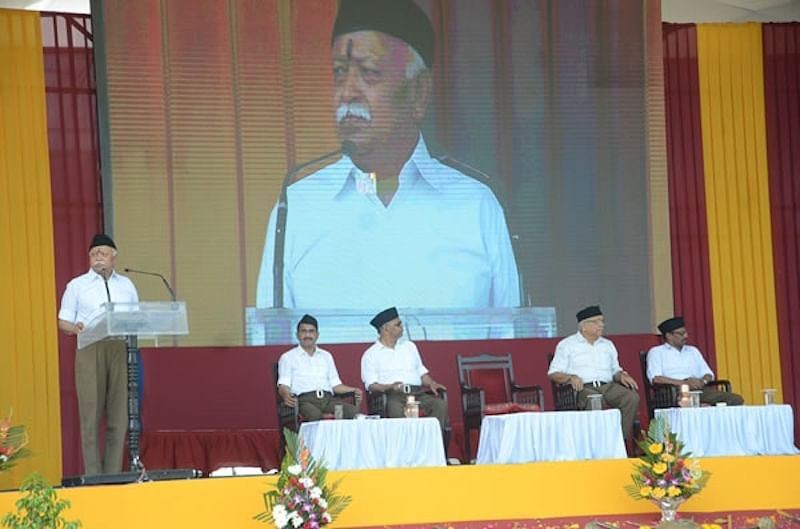At his foundation day/Dussehra speech in Nagpur, chief Mohan Bhagwat has shown the roadmap, and it’s clear that RSS is here to stay and excel.
On Vijayadashami, the Rashtriya Swayamsevak Sangh (RSS) turned 92.
It was founded in 1925 by Dr K.B. Hedgewar by bringing together a few youngsters. Since then, it has grown continuously, touching and influencing every sphere of life in India today. Millions of swayamsevaks attend shakhas daily, thousands of pracharaks have dedicated their lives to the RSS, and hundreds of thousands of service projects have been initiated to help society.
The Sangh has a network of hundreds of organisations focussing on every aspect of life, nationally and globally – from students to labourers, health to rural development, disaster relief to rehabilitation, religious activities to politics.
Hindrances at every step
The matchless progress of the RSS was not without hindrances. In 1948, the RSS was banned under the false accusation of Mahatma Gandhi’s murder. Later, Jawaharlal Nehru publically stated his intensions to “crush” the Jana Sangh (the precursor to the BJP as an RSS-inspired political outfit).
Then, in 1975, the RSS was at the centre of Indira Gandhi’s dictatorial onslaught.
More recently, when the UPA regime realised it was impossible to stop the RSS, it coined new narratives like ‘Hindu terror’ and ‘saffron terror’ to mislead the people of India. But not only did the Sangh successfully fight these attacks through democratic and constitutional means, it also excelled after every such attempt against it.
What led to success
There are several unique reasons for this success story.
First, the RSS has an uncompromising position on issues like national integrity, security, and social harmony, which is coupled with thousands of service projects, agitations, and campaigns for social awakening on important issues. This has created tremendous goodwill within society at large, even though some people would have ideological or political differences with the RSS.
A classic example is when a natural calamity occurs – many people and organisations who have never interacted with the RSS or have opposed it otherwise approach it to channelise resources for relief and rehabilitation. This is because they are confident that the RSS provides the most efficient, productive, and clean mechanism for such efforts.
Second, though RSS swayamsevaks proudly display their organisational affiliation – their routine of shakha, associated programs, and even their uniform – their identity is inseparable from the society they work in. They aren’t like oil in water; more like sugar in water. In return, society expects a definite set of work ethics, adherence to values, and efficiency from RSS volunteers. Even the slightest deviation from these norms is not taken lightly by society.
Throughout its journey, the RSS has also encouraged its cadres and affiliated organisations to initiate new experiments, monitor them closely, quickly replicate them across the country, modify them as per local needs, and abandon them if not successful. There are also those who have walked out of its fold and started projects to help society, and the RSS has always backed them to the hilt.
There is no bigger and diverse social experiment laboratory than RSS. But the RSS doesn’t claim credit for this success story – instead, it emphasises a “for the society, by the society” principle. This symbiotic relationship between the RSS and society is its true strength.
What the future holds
Two recent events throw some light on the future course of the RSS.
The first was Sarsanghchalak Mohan Bhagwat’s interaction with diplomats from dozens of countries, where he cleared the RSS’s position on several issues to an audience that was either ignorant or heavily influenced by the mainstream English media. He distinguished between Hinduism and Hindu-ness, stated that the RSS was not in the business of imposing eating habits, opposed trolling on social media, and elaborated on the RSS’s relations with the BJP government by saying they had regular dialog but did not control each other.
The second was his speech in Nagpur on Dussehra. He differentiated the true ‘gau rakshaks’ from those who broke law and order. He also supported the pro-poor measures of the government, emphasised the need to lend a helping hand to those sections of society which are in distress, and most importantly, stated that the government alone could not do everything, and that the participation of a vibrant, organised society was imperative to attain these goals.
It is therefore clear that the RSS will extend its outreach to untouched sections of society within and outside India, who are interested in developments in this country. It will also continue its tradition of supporting social initiatives like Jaggi Vasudev’s Rally for Rivers, encourage social vigilance and participation in government initiatives, and continue to raise flags on issues of national security and integrity.
After the election of Venkaiah Naidu as Vice-President of India, there was a wave of posts in the media about the top three positions in the country being occupied by people associated with the RSS. What many failed to understand and appreciate was that it’s a natural manifestation of strength of the RSS, coupled with the enormous goodwill for the RSS within a large section of society, which is nationalist and patriotic at its core.
The RSS will stay and excel for the next several decades to come. It’s not a statement of arrogance but one of confidence arising out of its journey so far.
